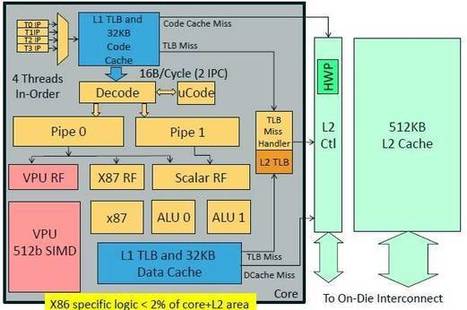The advent of Intel's massively parallel coprocessor will make every server a supercomputer. This week, Intel unveiled its new Xeon Phi coprocessor, which puts an astonishing 50 x86 cores onto a single PCI-connected card. The term "coprocessor" should be understood in context. Every one of the Phi's cores can boot Linux and run any x86 software. However, the card itself needs to plug into a system that has an independent CPU, which basically oversees the Phi's operations. Hence, the coprocessor appellation. The first model to be released in Q1 of next year will have 50 cores, and the follow-up coprocessor slated for release in mid-2013 will have 60 cores. Each processor supports four threads, making for 200 threads for the initial Phi. The cores run at 1.05 GHz and sport a 512-KB L2 cache each. They collectively share 8 GB of GDDR5 memory. They will liely compete with GPU based solutions from NVIDIA and AMD - but with a more familiar programmign model. Things just got very interesting in the high performance compute world. Click on the image or the title to learn more.
Research and publish the best content.
Get Started for FREE
Sign up with Facebook Sign up with X
I don't have a Facebook or a X account
Already have an account: Login
A few things the Symbol Research team are reading. Complex Insight is curated by Phillip Trotter (www.linkedin.com/in/phillip-trotter) from Symbol Research
Curated by
Phillip Trotter
 Your new post is loading... Your new post is loading...
 Your new post is loading... Your new post is loading...
|
|










